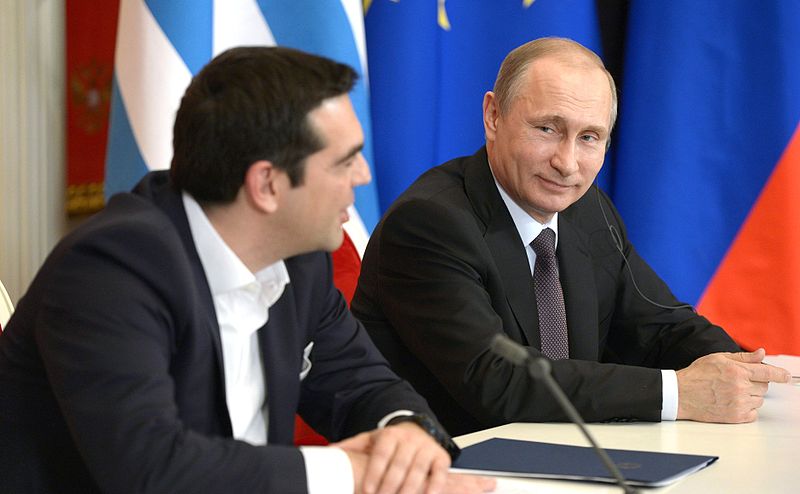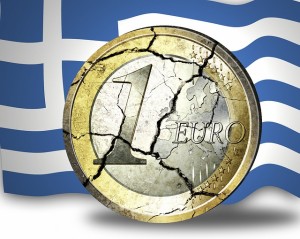Putin’s Trojan Horse: Perspectives on the Greece Debt Crisis
Since the rise of Alexander Tsipras and the Syriza party to power in Greece this past January, Greece has become the epicenter of Europe’s political landscape. Signalling its ardent stance against austerity policies in the Eurozone, it has spent the last four months unabashedly rejecting the will of the “Troika,” a collective term for the European Union, European Central Bank (ECB), and the International Monetary Fund (IMF). Greece’s thinly-veiled refusal to pay back the financial bailout package it received back in 2010, a debt now amounting to nearly $300 billion, has even placed the possibility of a Greek exit from the Euro on the table. As its June 30 deadline looms, the prospect of a Greek default threatens to not only undermine the economic credibility of Europe’s financial institutions, but also the political cohesion of the European Union. Despite the potential fallout, neither side has made any grand gestures of goodwill in order to reach a compromise in the eleventh hour. Greece’s European creditors appear to have had enough with negotiations. The IMF has drawn a line in the sand with this month’s debt negotiations, as Managing Director Christine Lagarde dismissed Greek demands for an extension until the year’s end. The ECB has repeatedly been at loggerheads with Greece over proposed domestic financial reforms in exchange for euro funding, with both parties waiting on the other to initiate their end of the bargain first.
Prime Minister Tsipras, however, has done very little to endear himself with either of these entities, let alone other European heads of state. His campaign’s platform decried the financial oppression levied against Greece by its creditors, blaming the country’s rampant unemployment and economic stagnation on the austerity measures enforced by the EU following the 2008 recession. He achieved approval ratings as high as 72% in February as his travelling two-man show with finance minister Yanis Varoufakis wrangled Greece its current credit extension. Tsipras then alienated Chancellor Merkel in March when he went so far as to demand that Germany cover Greece’s debts, in order to wipe clean its own record of unpaid World War II reparations. Not just damaging Greece’s own foreign relations, the prime minister has even undermined the entire EU’s attempt to mount a united front for the Ukraine conflict by opposing its economic sanctions. For a man who ran on the assurance that he would not lead the charge of the “Grexit,” many believe Tsipras is toeing a rather dangerous line.
As damaging as it would be in the short run for Greece’s economy and the euro’s value, a Greek default on its own would not sound the alarm for the long-run prosperity of the EU. Such a default occurred before when Iceland allowed its national banks to collapse in 2008, instead of bowing to pressure from the IMF and the OECD, who insisted upon bailing them out. Despite unemployment rising 900% and GDP sinking 10% initially, Iceland survived the proverbial trial by fire and now boasts an unemployment rate of 4.6% and a record GDP. Furthermore, countries such as the United Kingdom, Denmark, and Sweden have all acted in unison with the EU’s economic agenda, despite their existence outside of the Eurozone. So, while the “Grexit” would be unprecedented, any existential threats that the potential of a Greek defaults poses for the EU would have to stem from an exterior entity that stands to profit from the falling-out. Therefore, the issue finds itself inextricably linked with Russia.

Russia, with Vladimir Putin at the helm, subscribes to the Cold War era paradigm that deems Russian and European prosperity to be mutually exclusive, with one’s progress always coming at the expense of the other. Russia undoubtedly views the institutional inertia that has carried NATO and EU enlargement eastward since the fall of the Soviet Union as a threat to its future status as a world power. With both institutions now boasting member states that border Russia, Putin has repeatedly stated that the west has violated previously agreed-upon understandings, and that further expansion can only be interpreted as hostile encroachment. Russia employed this rationale in justifying its invasion of the Crimea upon Ukraine’s election of a pro-EU government, and has since only found further vindication in the reactionary economic sanctions enacted by western governments. Putin’s willingness to subject his nation to such ostracization amongst the international community has signalled Russian determination to undermine the EU in order to protect a status quo in which its status is secure.
That determination for political subterfuge has manifested itself in the form of a well documented campaign of funding and organization by Russian banks and policy institutes to support nationalist parties throughout the EU. Russian aid helped eurosceptic parties, such as the National Front in France, the Alternative for Germany in Germany, and the Golden Dawn in Greece make substantial gains in last year’s European Parliament elections. The crown jewel of the Russian soft power effort, however, was gaining an ally amongst European heads of state in Greece this year.
The election of Syriza to power in Greece allowed Russia to get its foot in the door of EU affairs and essentially provided it with a vicarious seat at the negotiating table. Athens and Moscow have since forged a dynamic relationship based on a general Greek approval of Russia that stems from their common eastern Orthodox tradition and the latter’s role as liberators during World War II. In contrast to recent years, the dialogue between the two states has grown dramatically in 2015. Russian ambassador Andrey Maslov has met with Greek ministers of government on 12 separate occasions so far; no such meetings occurred in all of 2014. Furthermore, Prime Minister Tsipras has convened with President Putin, either in person or over the phone, every single month since the election. As a result, Greek rhetoric has fallen in line with Russian talking points. The Syriza government remains a staunch opponent of EU sanctions as it claims Russia’s counter-ban on imports has cost its agricultural sector over $47 million in lost exports in the past year. Moreover, it has equated EU backing of the Ukraine and the Euromaidan movement with the sponsorship of neo-nazi politics, a calculated jab at the EU’s German-centric nature. Greece’s adoption and promulgation of Russian views has coincided with the end of the line for debt reconciliation to form the perfect storm for both the future of the Eurozone and the EU.
Russia has found in Greece its proverbial Trojan horse to undermine the EU. Putin has played Greece against its counterparts, managing to exploit the longstanding nationalist tensions and cultural rifts that have festered amongst the EU’s member states. By fanning the flames of Greek resentment and sponsoring anti-austerity, anti-Merkel nationalist parties, he has managed to weaken German stewardship of the EU for the foreseeable future. Now that a Greek default appears inevitable, Russia finds itself presented with an opportunity to further pry Greece from the EU in the ensuing fallout.
Indeed, the animosity between the Eurozone and Greece has escalated to an all-time high. Talks between Eurozone finance ministers and their Greek counterpart, Yanis Varoufakis, skidded to a halt when the latter made the announcement that a July 5 referendum would be the final verdict on the ultimate deal. The inability of Greece to reach any common ground with its creditors has trickled down to its citizenry, which decries what they see as the destruction of their nation by an inescapable cycle of debt. With the ECB set to withhold further emergency funds and the Eurozone expected to enact capital controls, that same Greek citizenry will have an easy time assigning a scapegoat for their impending economic woes. If Argentina’s disastrous 2001 default is any sign of things to come, then those woes will provide more than enough kindling to fuel a fiery Grexit.

The irony of Greece’s potential exit from the EU, however, lies in the fact that Greece has no means to survive as a nation independent of the support of others. The initial admittance of Greece to the Eurozone in 2002 drew heavy criticism, as its import-heavy economy consistently ranks as one of the worst in Europe and its corruption is well-documented. While Tsipras and his government advocate for greater pension and tax cuts, Greece’s GDP per capita hangs at 66% of the EU average and will, presumably, continue to sink further. After all, the cornerstone of the Greek economy, tourism, will undoubtedly suffer from the impending civil unrest and growing xenophobic consensus. It is this combination of political resentment and economic impotence that could result in an ugly breakup between the EU and Greece, one that would likely send Greece straight into the warm embrace of Russia.
Despite unrelenting sanctions from the EU, Russia still has the resources to pull neighboring states into its political orbit. It has withstood the west’s hostile climate by taking advantage of the Achilles heel of all developed nations: energy dependency. Where sanction loopholes exist, Russia continues to deliver coal and natural gas to its western clientele; when roadblocks emerge, it redirects its contracts and finds new markets. Forced to do so out of economic necessity, Russia has already expanded its energy politics south by means of the Turkish Stream pipeline. Meant to circumvent the Ukraine entirely, the proposed pipeline would transport Russian gas beneath the black sea and into Turkey and Greece without running the risks associated with a country wracked with civil war. The true allure of the Turkish Stream for Russia, however, lies in its dual function as a means of strategic investment in foreign infrastructure. The deal struck between the Russians and the Greeks, valued at $2 billion, centers around initial Russian financing of the project, leaving Greece to pay off their share over time. Not only does this arrangement expand Russia’s economic sphere of influence further into the EU, but it will also serve to ignite Greece’s significant refinery sector. The Turkish Stream is a clear signal reflecting a Russian commitment to invest in states spurned by the EU in order to bolster its own de facto political bloc.
For now, the futures of both Greece and the European Union remain murky: No one can fully predict the type of fallout that will occur once Greece truly defaults on its debt. That being said, ongoing trends do provide enough information to determine the developments that will likely accompany the financial fiasco. Prime Minister Tsipras has alienated all of Europe with his staunch resolution to resist austerity measures and sees in Russia’s Vladimir Putin his one true ally. The European Union, having developed quite the distaste for Greece and its antics in the past five months, will ensure the solvency of the Eurozone by withdrawing investment from Greece. As Greece plunges into economic depression, Tsipras’s willingness to pass the buck to the citizenry will lead to further referendums, which will undoubtedly concern themselves with the prospect of a Grexit at some point. Russia, seeking to encourage anti-EU sentiment, will exploit the divisive situation in order to ply Greece from the European Union and, along with Turkey, establish a Russia-friendly corridor along the Mediterranean.
Regardless of just how the chips fall, the Greek debt crisis will go down in the books as the key example of how, in a globalized economy, monetary policy intrinsically links itself with foreign policy.
